27+ Sample Birth Plans
-
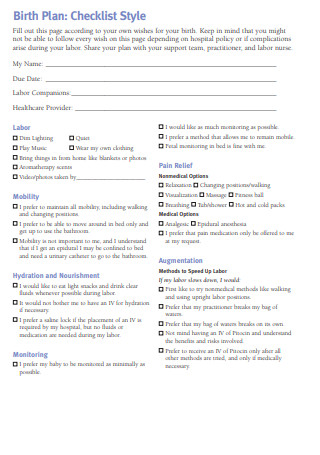
Birth Plan Checklist
download now -
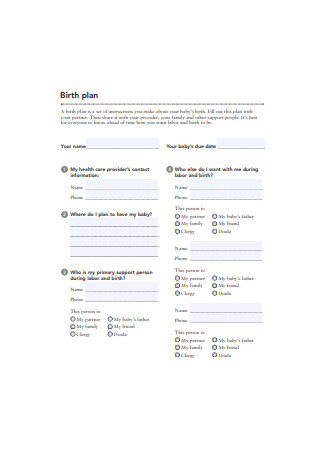
Birth Plan Format
download now -
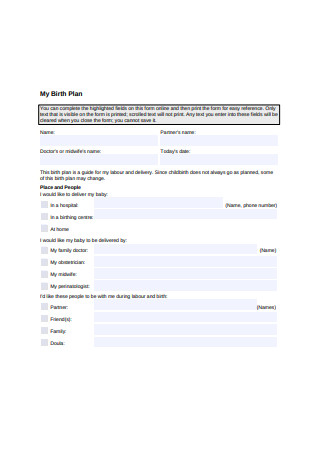
Sample Birth Plan Checklist
download now -
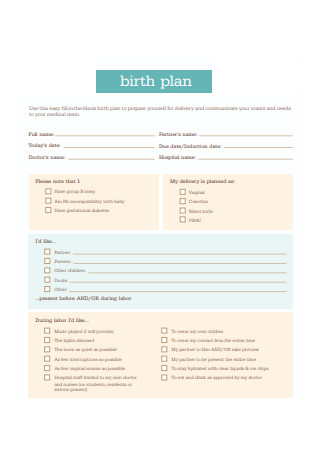
Birth Plan
download now -
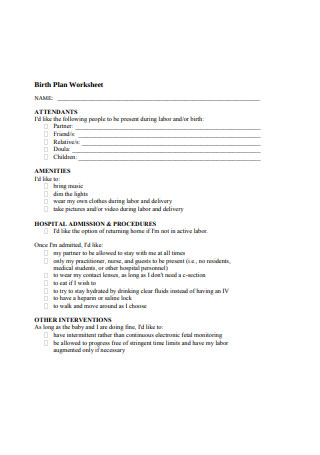
Birth Plan Worksheet
download now -
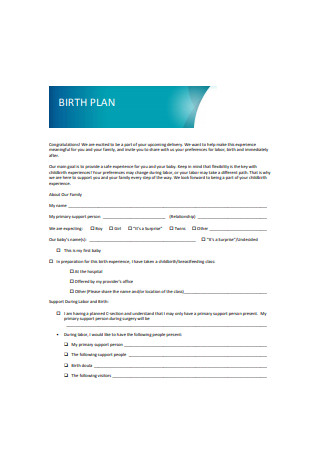
Family Birth Plan
download now -
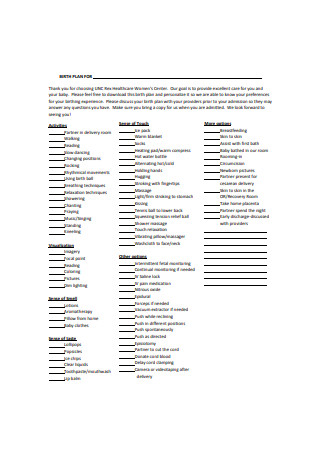
Sample Birth Plan
download now -
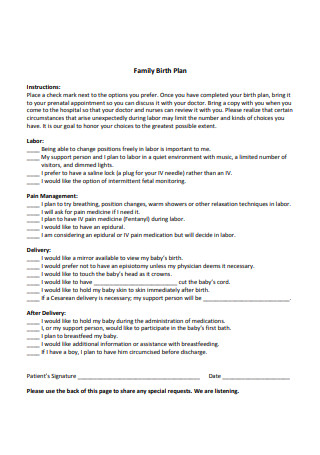
Family Birth Plan Format
download now -
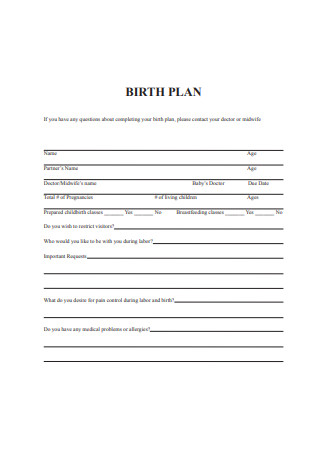
Formal Birth Plan
download now -
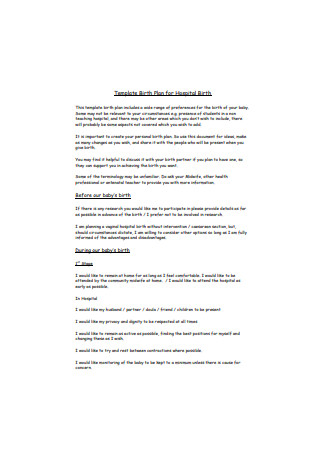
Birth Plan Template
download now -
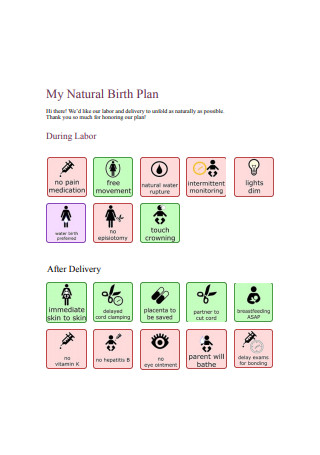
Natural Birth Plan
download now -
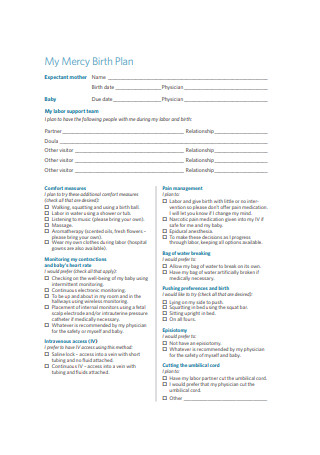
Birth Plan Example
download now -
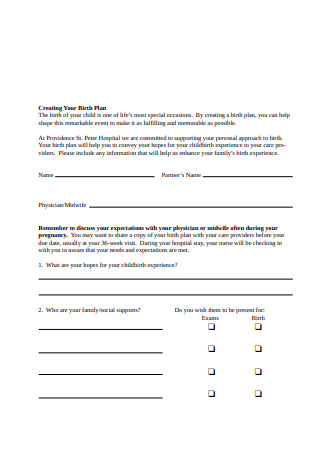
Basic Birth Plan
download now -
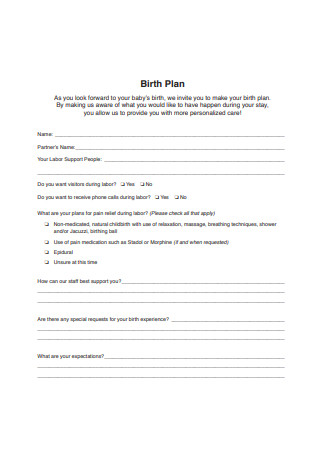
Birth Baby Care Plan
download now -
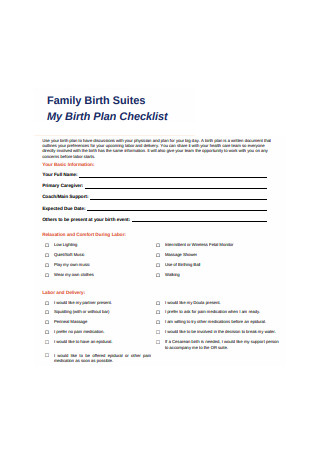
Simple Birth Plan Checklist
download now -
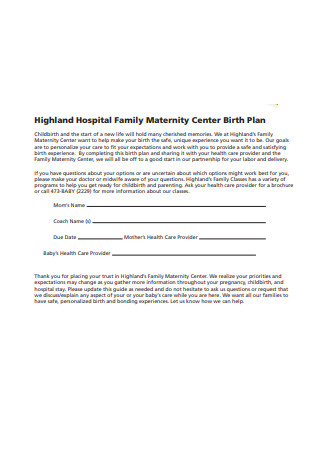
Family Birth Plan Sample
download now -
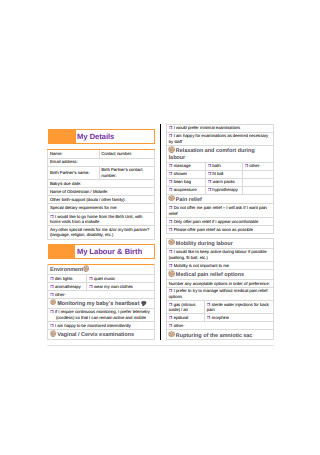
Birth Plan Fact Sheet
download now -
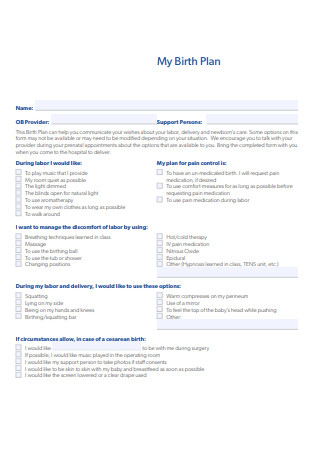
Basic Birth Plan Format
download now -
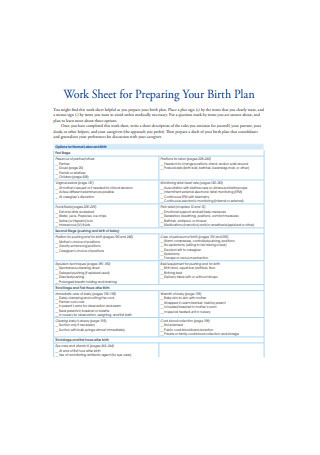
Sample Birth Plan Worksheet
download now -
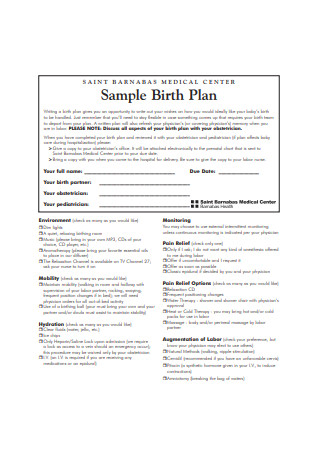
Sample Birth Plan Example
download now -
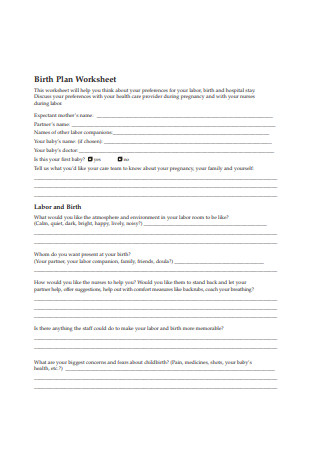
Basic Birth Plan Worksheet
download now -
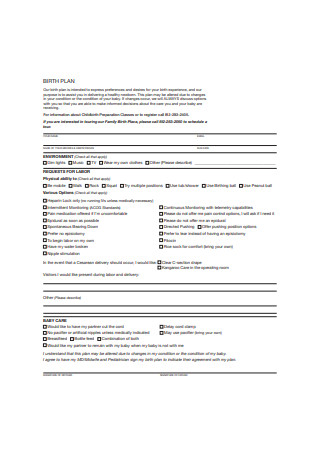
Standard Birth Plan
download now -
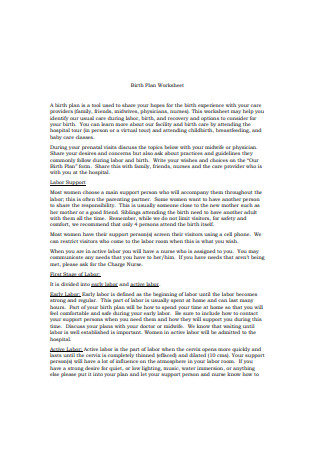
Formal Birth Plan Worksheet
download now -
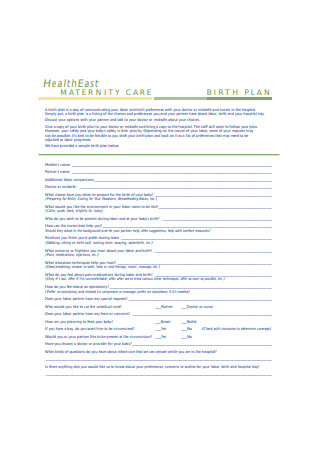
Sample Birth Plan Format
download now -
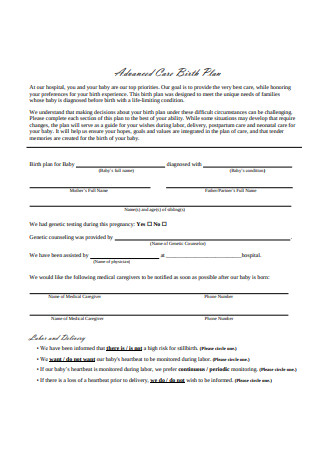
Basic Birth Plan Example
download now -
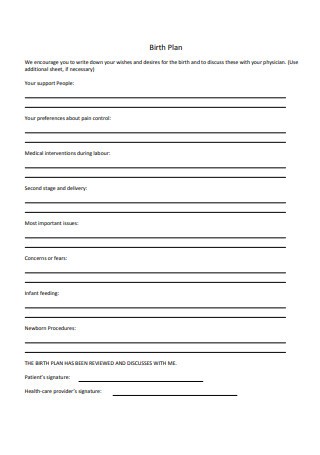
Standard Birth Plan Format
download now -
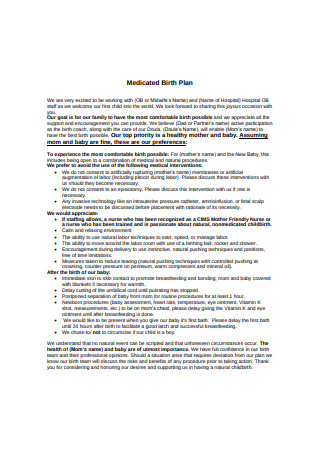
Medicated Birth Plan
download now -
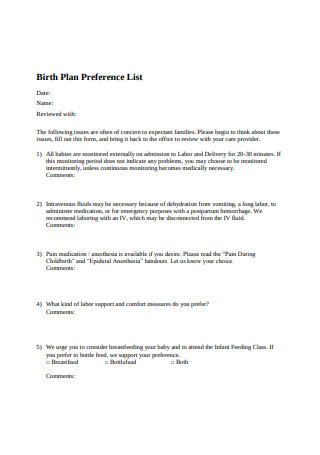
Birth Plan Preference List
download now -

Birth Planing for Mothers
download now
What Is a Birth Plan?
A birth plan is a document that expectant mothers (and their partners) use to inform their medical team about their labor and delivery preferences. Think of it as a personal wishlist that communicates your desires for the ultimate birthing experience. It’s also an opportunity for you to identify issues that your health care provider may address, especially if these matters can influence your decisions.
How much you include in the birth plan is entirely up to you. Most people aim for one or two pages, but try not to worry if it goes a few points beyond that of a simple birth plan checklist. The birth plan should help minimize disappointments and elminate major issues drawn by misscommunication. As for how these birth plans come to be, many hospitals offer a standard form that you can fill up with the necessary data. Experts recommend reviewing these plans with your health care provider during the final stages of your pregnancy for some helpful advise regarding your concerns.
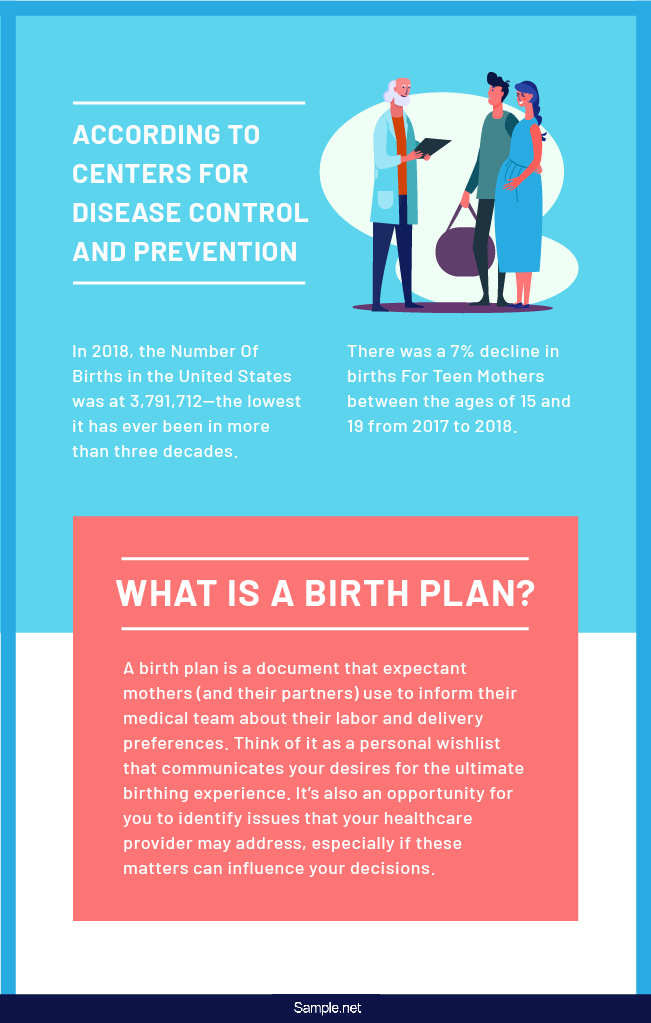
The Importance of a Birth Plan
A 2018 study by the Centers for Disease Control and Prevention records the number of births in the United States at 3,791,712—the lowest it has ever been in more than three decades. We also see a 7% decline in births for teen mothers between the ages of 15 and 19 from 2017 to 2018. There are many factors that contribute to this significant drop in numbers, with proper planning being one of them.
Now the question stands: is a birth plan, like a family plan, as necessary as people make it seem?
If a baby is in your future, you’ve probably been spending the past few weeks stocking up on baby essentials to get ready for when your little one arrives. Planning every moment leading up to childbirth is something that every woman should consider doing as part of their journey to motherhood. A birth plan, for one, ensures proper communication between you and your medical team. It outlines how you wish your birth experience would be like during labor and after the delivery of your child. Letting your health care providers know about your preferences in advance is one way to avoid a rather unpleasant experience.
Keep in mind that every birth experience is unique. You can’t copy someone else’s birth plan, nor can you expect yours to go the way you hoped it would. It’s a good idea to discuss your concerns with your midwife or OBGYN beforehand to find out what’s possible and what isn’t.
How to Prepare a Birth Plan
The day you’ve been waiting for is fast approaching. By now, you might be feeling anxious yet excited for your little bundle of joy to finally arrive. But it’s never an easy experience for any expectant mother; thus, you need to make sure you have all the bases covered with the help of the following guidelines.
Step 1: Visualize Your Ideal Birth Setting
The first thing you need to do when writing a birth plan is to talk to your partner about it. Even if you had to endure the most in the last seven to nine months of pregnancy, your partner should still have a say in your birth plans. Look into each scenario with its benefits and risks in mind. You can discuss matters regarding the kind of birth you envision, the type of care for the baby, and other crucial decisions that you can make together. It’s an opportunity for you to explore your options together and to prioritize your values as individuals.
Being parents is a demanding job that will change your lives forever. So unless you can agree on a good birth plan, how do you expect to make decisions for your child’s upbringing?
Step 2: Consider What’s Practical
Do you intend to give birth in a hospital, a birth center, or at home? Your birth site may affect your birth plans due to the policies that these places enforce. Expectant mothers need to look into the practices and regulations observed by the location’s health care providers to avoid problems down the road. You can also research on the facilities and equipment available to find out if they meet your desires. If you refuse to share rooms with another person during your stay, you must state this clearly in your birth plan. If you want to have someone film your birth experience for a personal keepsake, inform the nurses sometime before your due date. That way, you can verify your preferences with the medical staff to determine whether they are feasible or not.
Step 3: Think of the Environment You Want
Make a list of the things you think you’ll need to feel comfortable for the next couple of days. You might have a pair of fuzzy slippers you’ll want to use to get around, a playlist of relaxing music that could calm your nerves during labor, or a book to keep you company as you recover. Many mothers turn into monsters due to the discomfort brought by having to push another human out of their tiny bodies. Hence, most health care providers are considerate enough to grant these requests to a reasonable extent. Anything that could divert your attention away from the excruciating pain may have a spot in your birth plan.
Step 4: State Your Preferences on Pain Medications
It’s incredible how much pain a woman could go through during childbirth. It’s even more surprising to know that some expectant mothers choose not to be on pain medications during labor as a personal preference. Although this decision will likely change when the time comes, you can always discuss the alternatives with your doctor. Many experts would suggest non-pharmacological comfort measures for temporary relief, which is an excellent option for patients who aren’t too keen about the idea of taking high doses of pain medications the entire time.
Step 5: Prepare for the Unexpected
Open your mind to the possibilities that could change your birth plan, as things may take a dramatic turn compared to what you initially expected. By designing your plan with a positive focus, you can create a list of wishes that centers on what you hope would happen under the care of your medical team. That way, you can remain calm and collected even when under pressure.
The Dos and Don’ts of Birth Plans
Childbirth is full of surprises. You never know what could happen in the delivery room, so you want to be ready for whatever is possible. Birth plans give you an idea of what you want your labor and delivery to be like. But because there are many aspects of childbirth that one must consider, it’s essential to be reasonable with your plans.
With that said, here are a few tips for making an effective birth plan that you might want to note:
Dos
1. Do personalize your birth plan.
You can find a ton of pre-written forms and worksheets available online that cover the basics of a birth plan. While these birth plan templates are an excellent start to your journey, you can’t rely on them to do all the work. Every case is different, and as a patient, it is your responsibility to communicate your wishes directly to health care providers for their convenience (and your satisfaction). It should be short and readable to explain your choices in a way that readers may quickly grasp. Refrain from adding needless information that they won’t find useful, primarily if they no longer address the main concerns of your birth journey.
2. Do educate yourself.
Before you begin writing your birth plan, ensure you have everything covered. You don’t want to lay on a hospital bed utterly clueless about what happens next. Exposing yourself to various options and possibilities will help you make more informed decisions for yourself and your unborn baby. You can gain the knowledge you need for things to run smoothly by attending classes, reading journals, and asking other mothers about their birth experience. It’s only then that you’ll realize how little you know about labor and delivery.
3. Do make it realistic.
While we all have our preferences, you can’t expect the hospital to deliver to your demands. As much as you want a quiet environment, you can’t expect every other patient who are on labor to be as silent as you want them to be. It’s not that the nurses don’t care about the things that bring you comfort, but medical providers can only do so much with what they’re permitted to do based on protocol. Some of your wishes may be impossible to fulfill, so you’ll be forced to settle with what’s available at the moment.
4. Do write down your medical history.
It won’t hurt to outline details of your medical history in your birth plan. Although this data may already be found in your medical record and on your hospital chart, emphasizing this in your birth plan may be helpful to hospital staff. You can include information about prior pregnancies and deliveries, allergies, chronic medical conditions, and other considerations that health care providers may need to know about.
5. Do express your wishes for labor and delivery.
Are you planning natural labor without an epidural? Or would you rather get a c-section when the day comes? While your plans could change at the last minute, it’s always a good idea to go to the hospital fully prepared for the unknown. You need to be clear about your choices to avoid making any rash decisions that you’ll soon end up regretting. After all, no one wants to recall the time they brought new life to the world as one of their most dreadful experiences.
Don’ts
1. Don’t be too demanding.
You can have what you consider as the perfect plan, but even your own baby can betray your wishes in a heartbeat. While hospital staff can always work around your preferences, you must never argue with them over matters that play no importance in you and your baby’s treatment. There’s a difference between a wishlist and a list of demands, particularly on the authority you think you hold over health care professionals. You should think of your birth plan as a simple wishlist rather than an instructional manual. If you believe your requirements are more important than what the doctors and nurses suggest, then you can expect nothing more than a long and complicated delivery.
2. Don’t forget to name the people you want around.
It’s always helpful to let the hospital know who you want to have with you in the delivery room. Whether it’s the father of your baby, your mother, sister, grandparents, or even a photographer to document the event, you need to let the nurses know about it in advance. Some hospitals limit the number of visitors allowed in the room at the time of delivery. So to stay on the safe side, be sure to clarify this with the management before telling your friends and family about your decision.
3. Don’t neglect postnatal care.
Include a section that focuses on how your newborn will be cared for after the delivery. Some mothers don’t feel comfortable about having skin-to-skin contact with their baby after getting a c-section, while others may want a couple more hours of rest before finally receiving some alone time with their newborn. You’ll also want to indicate your religious or cultural preferences that hospital staff must follow. Postpartum care should also be a priority to ensure a speedy and healthy recovery. Taking the time to examine your case with a medical professional is essential to avoid serious problems down the road. The last thing you’d want to do is to create a birth plan that fails to prioritize you and your baby’s overall health during the most critical time of your journey.
4. Don’t keep it to yourself.
Always consult your obstetrician or midwife about any options that apply to your case. It’s useless to have a birth plan if no one familiar with your pregnancy and medical background approves of your choices. It’s important to discuss these concerns with a professional prior to finalizing your plans. This approach serves as an opportunity for you to raise questions or issues that may cause problems down the road. It’s also a chance to improve your birth plan before the big day comes.
5. Don’t expect it to go as planned.
You might have the whole thing planned out in your head. And while there’s no harm in wanting to keep things organized, you can’t expect everything to go the way you imagined it to. Plans change due to unforeseen circumstances that neither you nor your doctors have the power to control. It might seem scary and disappointing at first, but if it means prioritizing your well-being over your wishlist, trust your doctors and nurses to get the job done successfully. Thus, you don’t want to waste too much of your time obsessing over every possible scenario. It’s best to make your birth plan flexible enough to cater to the unexpected.
Despite the smirks and eye rolls from strangers at the hospital, having a birth plan is not something to be ashamed of as a first-time mom or a caregiver of five. Birth plans offer a ton of benefits for those hoping to ease their minds from the stress of childbirth. The trick is to create a birth plan that is short, detailed, and easy to follow. By doing so, your medical team may act according to your best interests. What matters most is that you and your baby come out as healthy as ever after the whole ordeal.
